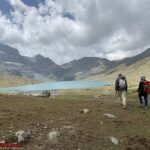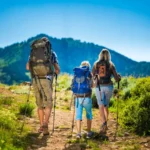Camping is a wonderful way to connect with nature, unwind, and create lasting memories with friends and family. However, to have a truly positive camping experience, it is crucial to practice good camping etiquette. In this comprehensive guide, we will explore essential tips and guidelines to help you become the best camper possible.
1. Respect the Environment
Respecting and protecting the environment should be a top priority when camping. By following these key practices, you can minimize your impact on the natural surroundings:
- Leave No Trace: Always clean up after yourself and leave your campsite as you found it. This means packing out all trash, including food scraps and wrappers. By disposing of waste properly in designated trash bins or carrying it back with you, you are preserving the cleanliness and beauty of the camping area.
- Stay on Designated Paths: Stick to established trails to avoid damaging vegetation and wildlife habitats. When you go off-trail or create shortcuts, you can unknowingly trample on fragile ecosystems and harm the local flora and fauna.
- Preserve Natural Resources: Use water sparingly and avoid polluting water sources. When camping, it is important to be conscious of water usage and minimize waste. Respect wildlife by observing them from a distance and refraining from disturbing their natural behavior. Additionally, avoid littering and minimize noise pollution to create a peaceful and undisturbed environment for all.
- Campfire Safety: If campfires are allowed, it is essential to use designated fire rings and follow fire safety guidelines. This helps prevent accidental wildfires and ensures the safety of both campers and the surrounding environment. Remember to fully extinguish the fire before leaving the area to prevent any potential hazards.
By following these practices, you can make a positive impact on the environment and contribute to the preservation of natural resources for future generations.
2. Be Considerate of Others
When camping, it is important to be mindful of other campers and their experience. Consider the following tips to ensure a harmonious camping environment:
- Keep Noise to a Minimum: Excessive noise can disrupt the tranquility of the camping experience for others. Be mindful of quiet hours and respect the serenity of nature. Keep conversations and music at a reasonable volume, and avoid unnecessary noise that may disturb fellow campers.
- Respect Campsite Boundaries: Each camper deserves their own space, so be sure to give others enough room and avoid encroaching on their designated area. Keep your personal belongings within the boundaries of your campsite, respecting the privacy and personal space of others.
- Control Pets: If pets are allowed at the campground, it is crucial to keep them on a leash and under control at all times. Not everyone may be comfortable or may have allergies, so being considerate of fellow campers is important. Remember to clean up after your pets and dispose of waste properly.
- Be Courteous with Lights: When using lights at night, avoid shining them directly into neighboring campsites. This helps maintain the natural darkness of the campground and allows others to enjoy the beauty of the night sky. Consider using low-level lighting or lanterns to provide illumination without causing disturbance.
- Share Common Areas: Campgrounds often have shared amenities such as picnic tables and grilling areas. It is essential to be considerate and allow others to use these spaces as well. Clean up after using shared areas and leave them in the same condition you found them.
By being considerate of others, you can foster a friendly and inclusive camping atmosphere that promotes harmony and a sense of community.
3. Prepare Properly
Proper preparation is the key to a successful camping trip. Consider the following essential preparations to ensure a smooth and enjoyable experience:
- Research the Campground: Familiarize yourself with the rules and regulations of the campground you plan to visit. Check if any permits or reservations are required in advance to avoid any last-minute surprises.
- Pack Appropriately: Bring all the necessary camping gear and equipment, including tents, sleeping bags, cooking utensils, and food. It is important to be prepared for various weather conditions, so pack suitable clothing and footwear. Consider the duration of your trip and pack enough supplies to ensure your comfort.
- Follow Campfire Regulations: If campfires are allowed, check if there are any fire restrictions or bans in effect. It is important to stay updated on the current regulations to prevent any accidental wildfires. When gathering firewood, opt for local sources to avoid introducing invasive species to the area.
- Plan Meals and Waste Management: Preparing meals in advance can save time and ensure you have enough food for your camping trip. Pack meals in reusable containers to minimize waste and avoid excess packaging. Properly dispose of food scraps to prevent attracting wildlife to your campsite.
- Consider Noise: Be mindful of the noise level of your camping equipment, such as generators or radios. Opt for quieter alternatives or use them sparingly to respect the peaceful ambiance of the campground. Remember, the sounds of nature are often the most soothing and enjoyable.
By properly preparing for your camping trip, you can minimize potential challenges and maximize your enjoyment of the great outdoors.
4. Be Fire Safety Conscious
Fire safety should always be a top priority when camping. Follow these guidelines to ensure a safe camping experience:
- Check Fire Restrictions: Before starting a campfire, it is crucial to check if there are any fire restrictions or bans in place. These restrictions are often in place to prevent wildfires during dry seasons or in areas prone to fire hazards. Always adhere to the campground regulations regarding campfires to ensure the safety of everyone.
- Clear the Area: Before starting a campfire, ensure that there are no flammable materials or overhanging branches near the fire pit. Clear a safe distance around the fire to prevent accidental spreading and to maintain a safe environment for everyone.
- Monitor the Fire: Never leave a campfire unattended. Assign someone to watch the fire at all times and keep a bucket of water or a fire extinguisher nearby for emergencies. By closely monitoring the fire, you can prevent potential accidents and quickly address any issues that may arise.
- Extinguish the Fire Properly: When it is time to extinguish the fire, pour water over the flames and embers, stirring with a shovel to ensure complete extinguishment. Repeat this process until the fire is cool to the touch. Properly extinguishing the fire is essential in preventing any re-ignition or accidental spreading.
By practicing fire safety, you can enjoy the warmth and ambiance of a campfire while minimizing the risk of accidents and ensuring the safety of yourself and others.
By following these camping etiquette guidelines, you can be the best camper possible and ensure a positive experience for yourself and others. Remember, respecting the environment, being considerate of others, and practicing safety measures are essential for an enjoyable and responsible camping trip. Happy camping!
FAQ
1. How can I minimize my impact on the environment when camping?
- Always clean up after yourself and leave your campsite as you found it.
- Stick to established trails to avoid damaging vegetation and wildlife habitats.
- Use water sparingly and avoid polluting water sources.
- If campfires are allowed, use designated fire rings and follow fire safety guidelines.
2. What should I be mindful of to ensure a harmonious camping environment?
- Keep noise to a minimum and respect quiet hours.
- Respect campsite boundaries and give others enough space.
- Keep pets on a leash and under control, and clean up after them.
- Avoid shining lights directly into neighboring campsites.
- Share common areas and clean up after using them.
3. How can I properly prepare for a camping trip?
- Familiarize yourself with the rules and regulations of the campground.
- Pack all necessary camping gear and appropriate clothing.
- Check for any fire restrictions or bans in effect.
- Plan meals in advance and dispose of food scraps properly.
- Be mindful of the noise level of your camping equipment.
4. What are the important fire safety guidelines for camping?
- Check for any fire restrictions or bans before starting a campfire.
- Clear the area around the fire pit of flammable materials.
- Never leave a campfire unattended and have a fire extinguisher or water nearby.
- Properly extinguish the fire by pouring water over the flames and embers.
Remember, following these guidelines will help you be a responsible and considerate camper, ensuring a positive camping experience for yourself and others. Happy camping!










